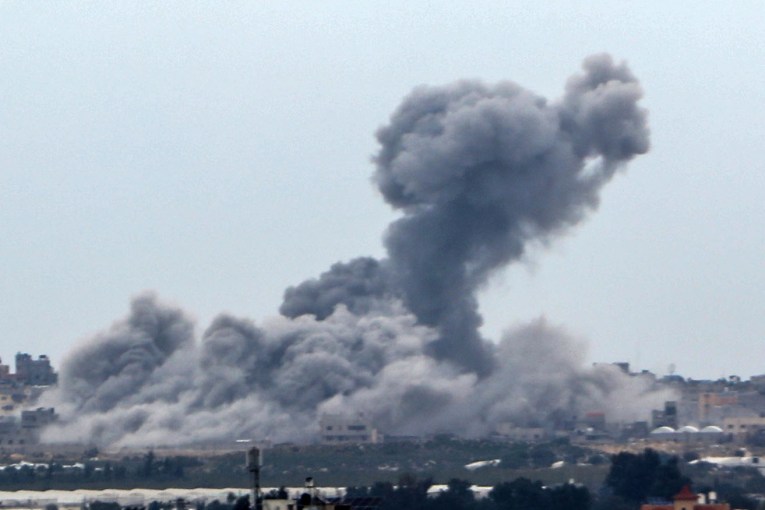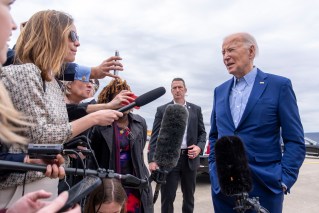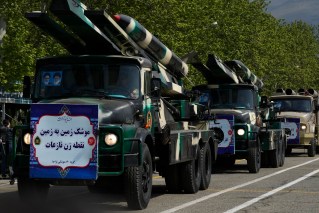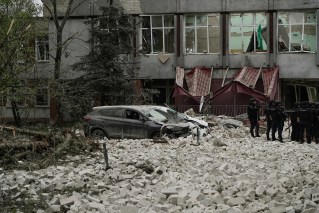US requests closed door UN meeting in response to North Korean nuclear threat

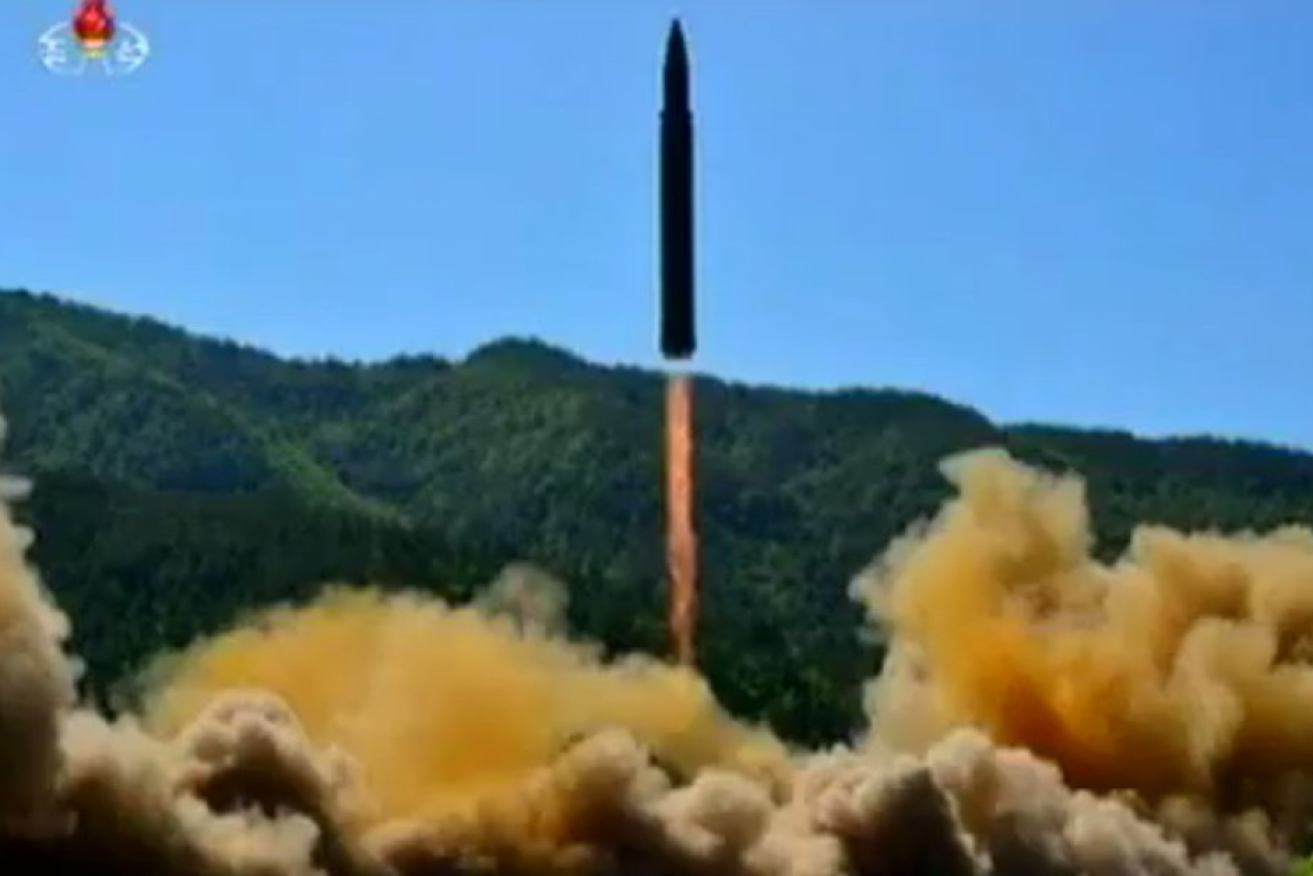
The Hwasong-14 missile launched by North Korea last week. Photo: KCTV
The White House has requested an urgent, closed-door meeting of the United Nations Security Council to discuss its response to North Korea’s latest missile launch.
A spokesman for the US mission to the United Nations said Wednesday morning (AEST) that the meeting of the 15-member council was likely to be scheduled for later Wednesday local time.
The unusual request comes as North Korea claims it successfully tested a new intercontinental ballistic missile – capable of hitting “anywhere in the world” – for the first time.
US officials reportedly said they believed North Korea’s claim that the latest missile could reach Alaska.
Russia and China have weighed into the increasing tensions on the Korean Peninsula, urging North Korea to “freeze” its missile and nuclear programs.
In a joint statement from Chinese leader Xi Jinping and Russian President Vladimir Putin, the world powers called for the simultaneous freezing of North Korea’s missile and nuclear program and large-scale military exercises by the United States and South Korea.
President Xi was in Moscow on Tuesday for talks with President Putin.
China and Russia also urged the US to not deploy the Thaad missile system – which aims to intercept attacks from Pyongyang – in South Korea.
Tuesday’s missile test, which North Korea’s state media said was ordered and supervised by leader Kim Jong-un, sent a Hwasong-14 missile some 933km from launch to splashdown, reaching an altitude of 2802km during the 39-minute flight.
A missile with that capability could have its trajectory adjusted to hit the US state of Alaska, one expert warned, but it is unlikely to reach right across the globe as the rogue state claimed.
But while Pyongyang appears to have made dramatic progress with its missile program, experts believe the device cannot accurately hit a target.
“The Democratic People’s Republic of Korea has become an imposing nuclear power with the most powerful ICBM capable of hitting any part of the world,” the state broadcaster KCTV said.

North Korean leader Kim Jong-un supervised the launch. Photo: KCTV
US, South Korean and Japanese officials said the missile was launched from an airfield in Panghyon, about 100km north-west of the capital, Pyongyang.
Authorities earlier confirmed the missile “greatly exceeded” 2500km in altitude and flew longer and higher than any other North Korean test.
They said it travelled roughly 930km before landing in Japan’s Exclusive Economic Zone.
The launch came just days before leaders from the Group of 20 (G20) nations were due to discuss steps to rein in Pyongyang’s weapons programs, which the North has pursued in defiance of UN Security Council sanctions.
Long-range missile ‘could reach Alaska’
From the five missile tests North Korea has conducted since May, Tuesday’s test is undoubtedly its most successful. One weapons analyst says the missile is powerful enough to reach the US state of Alaska.
“That range would not be enough to reach the lower 48 states or the large islands of Hawaii, but would allow it to reach all of Alaska,” Union of Concerned Scientists co-director of the Global Security Program David Wright said in a blog post.
Mr Wright claimed the missile’s flight time and distance covered suggests it was launched on a “very highly lofted” trajectory of more than 2800km.
He noted that the same missile could reach a maximum range of roughly 6700km on a standard trajectory.
“That range would not be enough to reach the lower 48 states or the large islands of Hawaii, but would allow it to reach all of Alaska,” he said.
US President Donald Trump responded to the latest launch with an attack on Kim Jong-un, asking whether “this guy [had] anything better to do with his life”.
Mr Trump questioned China’s actions against North Korea and said that it could “end this nonsense once and for all!”
North Korea has just launched another missile. Does this guy have anything better to do with his life? Hard to believe that South Korea…..
— Donald J. Trump (@realDonaldTrump) July 4, 2017
….and Japan will put up with this much longer. Perhaps China will put a heavy move on North Korea and end this nonsense once and for all!
— Donald J. Trump (@realDonaldTrump) July 4, 2017
Australia, Japan condemn tests ahead of G20 meeting
Australia Foreign Minister Julie Bishop condemned the “provocative ballistic tests” and said they were in breach of numerous United Nations Security Council resolutions.
“North Korea continues to threaten its neighbours while undermining regional and global security,” Ms Bishop said in a statement.

Julie Bishop labelled the missiles “provocative ballistic tests. Photo: AAP
“North Korea’s long-term interests would be best served by ceasing its nuclear and missiles programs and focusing on improving the lives of its long suffering people.”
Japanese Prime Minister Shinzo Abe also condemned North Korea’s actions, saying he would work alongside world leaders to increase pressure on the regime.
“Japan will work to increase international pressure on North Korea by uniting strongly with the US and South Korea,” Mr Abe told reporters.
Mr Abe said he will ask the presidents of China and Russia to play more constructive roles in efforts to stop the Pyongyang’s arms program.
“Leaders of the world will gather at the G20 meeting. I would like to strongly call for solidarity of the international community on the North Korean issue,” Mr Abe said.
He said the United States, South Korea and Japan will have a trilateral summit on North Korea at the G20. China’s leader Xi Jinping will also be at the July 7-8 meeting in Hamburg.
-with agencies
